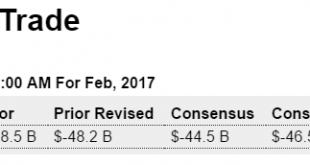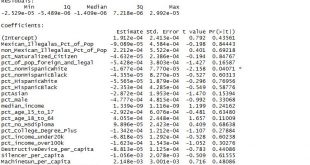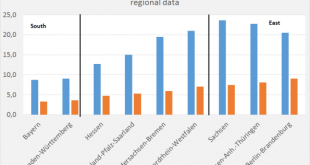The trade deficit was a bit less than expected, all due to lower imports. The question is whether this means there were more domestic purchases, whether this is an indicator of lower aggregate demand: HighlightsIn favorable news for first-quarter GDP, the nation’s trade gap hit Econoday’s low estimate in February at $43.6 billion and reflects a 1.8 percent drop in imports but only a 0.2 percent gain for exports. The goods deficit came in at $65.0 billion vs $64.8 billion in...
Read More »Open thread April 4, 2017
Vehicle sales, Construction spending, PMI, ISM
Big drop, and in line with collapsing bank loan reports: Highlights First-quarter GDP will take another hit, this time from March vehicle sales which like February and January proved weak. But the March data is unusually weak, down 5.7 in the month to a 16.6 million annualized rate that is a 2-year low. Sales of North American-made and imports both suffered, at 13.3 and 3.4 million rates, with light trucks and autos both down. Vehicle sales seem to have been pulled forward...
Read More »Love it or leave it?
from David Ruccio Those of us of a certain age remember the right-wing political slogan, “America, love it or leave it.” I’ve seen it credited to journalist Walter Winchell, who used it in his defense of Joseph McCarthy’s anti-communist witch hunt. But it’s heyday was in the 1960s, against the participants in the antiwar movement in the United States and (in translation, ame-o ou deixe-o) in the early 1970s, by supporters of the Brazilian military dictatorship.* I couldn’t help but be...
Read More »Globalization and The Great Reversal
from Jacques Sapir Globalization is not, and never was, “happy” whatever various ideologues said. The idea that “sweet commerce”, was to be substituted for warlike conflicts, was much propagated. But, in truth, it was only a myth. Still, the warship preceded the merchant ship. The dominant powers have constantly used their strength to open up by force markets and modify the terms of trade as they see fit. The globalization that we have witnessed for nearly 40 years has been in combination...
Read More »The Murder Rate – A Regression with Many Variables
In this post, I want to look at the murder rate, by state. I ran a regression with the state murder rate for 2015 as the dependent variable, and literally threw the kitchen sink at it: demographics, weaponry, income, education, population density, etc. Basically, if its something some reasonable percentage of the population believes matters, and I could find data for it, I threw it into the hopper. I also included variables relating to immigration status. The...
Read More »Mainstream flimflam defender Wren-Lewis gets it wrong — again!
from Lars Syll Again and again, Oxford professor Simon Wren-Lewis rides out to defend orthodox macroeconomic theory against attacks from heterodox critics. A couple of years ago, it was rational expectations, microfoundations, and representative agent modeling he wanted to save. And now he is back with new flimflamming against heterodox attacks and pluralist demands from economics students all over the world: Attacks [against mainstream economics] are far from progressive. [D]evoting a...
Read More »America’s hidden pains
from William Neil We begin with some gross numbers from Das’ Age of Stagnation: the loss of wealth from the Great Recession of 2008-2009. Citing the work of three economists at the Federal Reserve Bank of Dallas (Tyler Atkinson, David Luttrell and Harvey Rosenblum), the figures they put on the loss to the U.S. economy come to 6-14 trillion dollars, “equivalent to U.S. $50,000 to U.S. $120,000 for every American household, or 40-90% of one year’s economic output”. We’ve seen figures of...
Read More »Unemployed foreigners, Germany (Ausländerarbeitslosenquote)
from: Merijn Knibbe The graph shows the ‘Ausländerarbeitslosenquote’ (unemployed foreigners ratio) which is calculated by the ‘Bundesagentur fur Arbeit’ (a kind of German ‘Bureau of Labor Statistics’). Unemployment of Germans in East Germany is, after about a quarter of a century, finally below 10% (but still high). But unemployment among ‘foreigners’ is way higher (foreigners are not necessarily immigrants: refugees and people from the Not Very United Kingdom count but so does the...
Read More »Credit check
Yikes! Check out that 2nd derivative!;) Sure looks like something bad happened early in q416 to an economy already decelerating since oil capex collapsed just over a couple of years ago. Seems to me the only thing preventing a stock market collapse is a stock market collapse…;)
Read More » Heterodox
Heterodox






